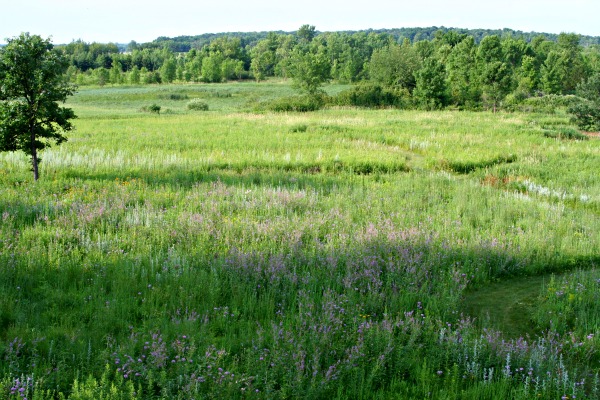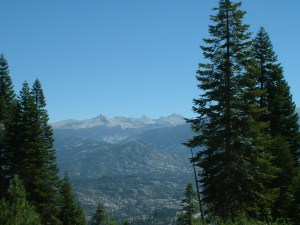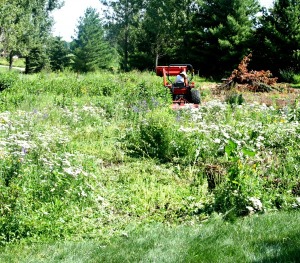 I finished reading Second Nature by Michael Pollan last night and I will miss it. In fact, I’ll probably keep it by my bed for late-night reading in the winter. It’s a tour de force of thinking about Americans and their relationship to the landscape. It brought together for me so much of my thinking about nature that I drafted a poem while reading it. I’ve been trying to write this poem for years.
I finished reading Second Nature by Michael Pollan last night and I will miss it. In fact, I’ll probably keep it by my bed for late-night reading in the winter. It’s a tour de force of thinking about Americans and their relationship to the landscape. It brought together for me so much of my thinking about nature that I drafted a poem while reading it. I’ve been trying to write this poem for years.
The poem is called “My Two Husbands.” I’ve long wanted to write something that lays out the differences and similarities between these two men, who I think would be great friends if they met (not going to happen), and with whom I’ve explored my own relationship to nature quite deeply.
 In 1992, my teacher Denise Levertov said she couldn’t understand why I wanted to be a poet because I didn’t care at all about nature. This hit me hard, and I think those years at Stanford marked an important point for me in thinking about my relationship with nature. At first all I could think about was my suburban backyard, it’s limitations, but also my love of Midwestern trees, the look of bare trees along the edges of fields in winter. My landscape was mostly viewed from the car, or from the high branches of our backyard tree (a view of Lincoln Highway one block away), or from a concrete path running through the forest preserve. I was actually homesick for that Midwestern landscape while living in Menlo Park, California, that seemingly ornamental landscape that could blind one with its beauty. I found it completely exotic and unwelcoming. I remember once looking out at a particularly stunning sunset and saying to the person next to me: “It looks exactly like a bad hotel painting.”
In 1992, my teacher Denise Levertov said she couldn’t understand why I wanted to be a poet because I didn’t care at all about nature. This hit me hard, and I think those years at Stanford marked an important point for me in thinking about my relationship with nature. At first all I could think about was my suburban backyard, it’s limitations, but also my love of Midwestern trees, the look of bare trees along the edges of fields in winter. My landscape was mostly viewed from the car, or from the high branches of our backyard tree (a view of Lincoln Highway one block away), or from a concrete path running through the forest preserve. I was actually homesick for that Midwestern landscape while living in Menlo Park, California, that seemingly ornamental landscape that could blind one with its beauty. I found it completely exotic and unwelcoming. I remember once looking out at a particularly stunning sunset and saying to the person next to me: “It looks exactly like a bad hotel painting.”
My first husband, George, was getting his PhD in American Poetry at Stanford at the time, and when we started our relationship in 1995, he was finishing a dissertation on the poetry of Robinson Jeffers, Kenneth Rexroth and American nature poets. He had formative experiences in “wilderness” and was completely Romantic in his thinking. He had hiked the Pacific Coast Trail, the Appalachian Trail, done a wilderness trip in the Quetico/Boundary Waters, and was most at home in the Sierras with a pack on his back.
We camped and backpacked, mostly in Door County and Wisconsin, but then, during a year in Reno in the Sierras. He accommodated me by (mostly) staying on the trail, never going too far before we set up camp (taking longer hikes from a base) and keeping our trips relatively short in duration. I adored those days and nights in the Sierras.
When that marriage ended, I moved back to the Midwest. I met and married my second husband, Steve, a landscaper. He loves spraying weeds more than anything. He grows straight rows of trees in his nursery. He has turned this acreage of dead agricultural land into barely restrained but completely deliberate wildness, filled with flowers and with paths running through it. He loves paths. When weeds encroach or threaten to get out of control, he kills them. He is not a Romantic. He is devoted to forms, to virtue, to a certain Classical order. We don’t camp. We do throw the bedroom door open wide in early spring to hear the frogs. We love the silence of snow.
 At the very end of Pollan’s book he talks about his new front lawn, which he let grow into a meadow. At first he was dissatisfied with his patch of grasses, which did not look to him like a meadow. Then one day he hit on the idea of mowing a path through it. All at once it became the meadow he desired. “That path, in my eyes anyway, is a thing of incomparable beauty, especially right after it’s been mowed. I don’t know exactly what it is, but that sharp, clean edge changes everything; it makes a place where there wasn’t one before. Where before your eye sort of skidded restlessly across the tops of the overgrown grasses, in search of some object on which to alight, now it has an enticing way in, a clear and legible course through the green confusion that it cannot help but follow… New possibilities have opened up: there’s now the prospect of a little journey.”
At the very end of Pollan’s book he talks about his new front lawn, which he let grow into a meadow. At first he was dissatisfied with his patch of grasses, which did not look to him like a meadow. Then one day he hit on the idea of mowing a path through it. All at once it became the meadow he desired. “That path, in my eyes anyway, is a thing of incomparable beauty, especially right after it’s been mowed. I don’t know exactly what it is, but that sharp, clean edge changes everything; it makes a place where there wasn’t one before. Where before your eye sort of skidded restlessly across the tops of the overgrown grasses, in search of some object on which to alight, now it has an enticing way in, a clear and legible course through the green confusion that it cannot help but follow… New possibilities have opened up: there’s now the prospect of a little journey.”
This is something that Steve understood intuitively when he made our prairie. The serpentine paths running through it welcome and give a narrative to the prairie. They invite bouquet-making. It makes all that wildness inviting and picturesque. When I think of George bounding up rocks in Joshua Tree or wandering out to the edge of a drop, off trail, I am glad that I found my way home from the Romantic adventure. There’s assurance and safety here that doesn’t compromise on beauty. And there’s less a chance of going off the path in other, more dangerous, ways as well.
And here is the draft of the poem (you can tell it’s not finished because of the irregular line and stanza lengths).
My Two Husbands
by Susan Sink
My husband went into nature, first the north woods of Michigan,
then the Sierras, the Pacific Coast Trail, whatever wildness he could find,
and spent his nights in poetry, Jeffers and Rexroth and Snyder,
thinking about wilderness and ideas of wilderness.
He was a Romantic—free and open-hearted,
happiest naked or nearly so, filtering the water
from an alpine pond, smelling the Jeffrey pines
and pronouncing them “vanilla,” building camp.
I followed him down the trail and admired
the way his legs moved, how his pack sat on his hips,
how he blew a fire to life with his bellows breath.
He told me about Emerson and Thoreau and Wendell Berry.
My husband went to seminary, bought a parcel of land
from the monastery, and while teaching religion,
learned how to make a prairie, and cultivated.
He bought machinery and built a shed to house it.
He is a man of Virtue—duty-bound and open-hearted,
happiest working hard outside, pulling weeds or mowing paths.
I follow him into the garden, where he built me twelve raised beds,
snaking hoses and planting straight rows, chopping weeds with my hoe.
I love to see him covered in dirt, in his broad-brimmed hat,
his easy amble on the path he’s worn between the machine shed and our house.
In the evening we sit down over a plate of good food and talk
about the news of the day, the frustrations of working the land, the triumphs,
the breezes cooling us through the screen of the porch.
He told me about Hauerwas and MacIntyre and Wendell Berry.
My husbands wake up early and make coffee,
one in a 12-cup stove-top percolator, the other espresso in a demitasse.
One filled the house with books of poetry on rough-hewn shelves,
the other with furniture that is sleek and modern, made of wood and metal.
He put the bed on wheels, so we can roll it to the window and hear the frogs,
while the other prefers no shelter at all, a bedroll on the ground.
Each night both men go outside and smoke a single cigarette. I think it is just
because they long to see the stars, and think about the rightness of the world.



Wonderful poem, recognizing the strengths of both.